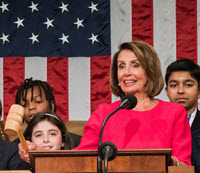A partial federal government shutdown over the issue of funding for a wall on the Mexican border continued this week after the new 116th Congress was sworn in and Democrats elected Rep. Nancy Pelosi (D-CA) as House Speaker.
 |
Democrats elected Rep. Nancy Pelosi (D-CA) as House Speaker at the start of the 116th Congress. |
 |
The partial government shutd own began Dec. 21 after negotiations were unable to resolve President Trump's request of at least $5 billion for construction of a wall versus Democrats' offer of approximately $1.3 billion for border security. |
The effects of the government shutdown and prospects for policymaking in the new divided Congress will be topics for discussion during The Roundtable's Jan. 29-30 State of the Industry Meeting in Washington, DC.
Outgoing House Ways and Means Chairman Kevin Brady (R-TX) released a draft bill on Jan. 2 that includes tax technical corrections to previously enacted legislation, including the Tax Cuts and Jobs Act (TCJA) overhaul.
 |
Outgoing House Ways and Means Chairman Kevin Brady (R-TX) released a draft bill on Jan. 2 that includes tax technical corrections to previously enacted legislation, including the Tax Cuts and Jobs Act (TCJA) overhaul. |
 |
The path forward for a technical corrections bill in the 116th Congress will be set by the new Ways and Means Chairman – Rep. Richard Neal (D-MA) . |
The Roundtable’s Tax Policy Advisory Committee (TPAC) will review these proposals, which will be a focus during TPAC’s Jan. 30 meeting, held in conjunction with The Roundtable’s State of the Industry Meeting in Washington, DC.